49 Secrets Your Pharmacist Isn’t Telling You BY ADAM BLUESTEIN, MICHELLE CROUCH AND COREY WHELAN ) courtecy;- reader's digest )
- লিঙ্ক পান
- ইমেল
- অন্যান্য অ্যাপ
Learn how to save money, avoid mistakes, and get the most out of your visit to the drugstore.
When you pick up your prescription, at a minimum, ask...
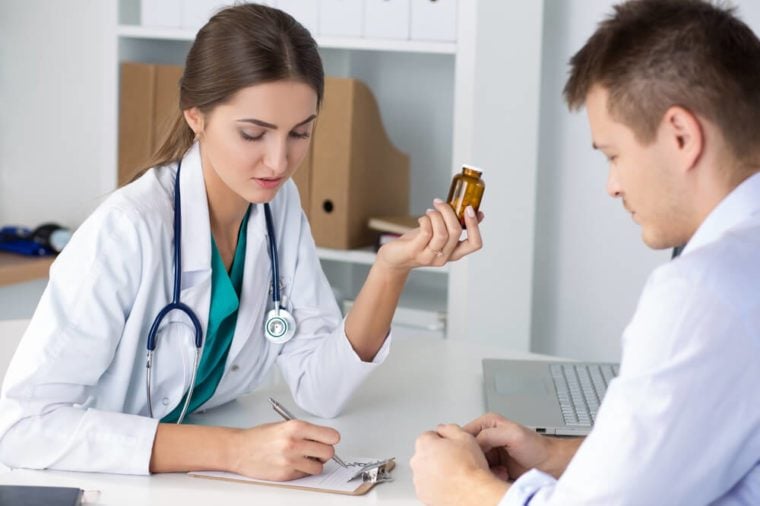 LDUTKO/SHUTTERSTOCK
LDUTKO/SHUTTERSTOCKWhat is this drug? What does it do? Why am I taking it? What are possible side effects? and How should I take it? Not only does this help you to use the drug correctly, it’s also a good way to double-check that you’re getting the right drug. Half the prescriptions taken in the U.S. each year are used improperly, and 96 percent of patients nationwide don’t ask questions about how to use their medications. Here are 10 super-important questions you must ask before taking prescription medications.
We're human…
 LSTOCKSTUDIO/SHUTTERSTOCK
LSTOCKSTUDIO/SHUTTERSTOCKAnd we make mistakes—about two million a year. Ask if we use a bar-code system to help keep us from pulling the wrong drug off the shelf or giving the wrong strength of the right drug.
Your pharmacist has spent more time studying drugs than even your doctor has
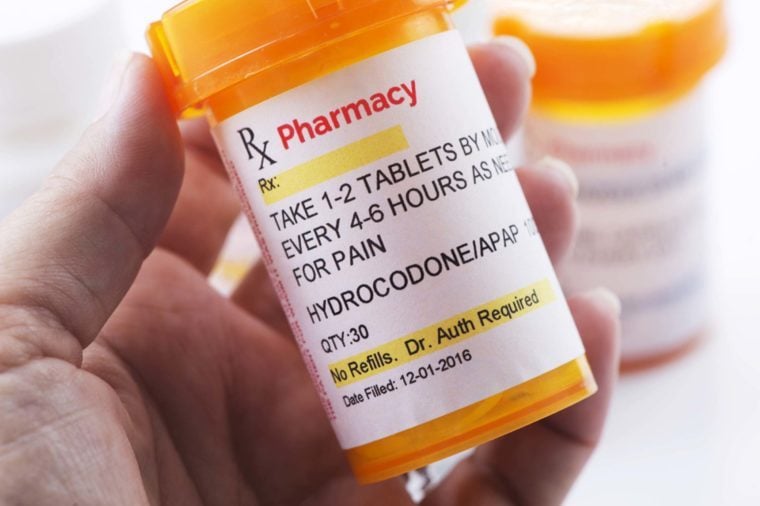 SHERRY-YATES-YOUNG/SHUTTERSTOCK
SHERRY-YATES-YOUNG/SHUTTERSTOCKGo ahead and call me doctor; I’m just not that kind of doctor. Since mid-2004, pharmacy students must pursue a doctorate in pharmacy (Pharm.D) in order to be licensed. Pharmacists licensed before then must have at least a Bachelor of Pharmacy and pass a series of exams. This is why your pharmacist probably knows more about your health than your doctor.
All pharmacists are not created equal
 VOY AGER/SHUTTERSTOCK
VOY AGER/SHUTTERSTOCKA less-qualified pharmacy technician may have actually filled your prescription. Currently, there is no national standard for their training and responsibilities.
People assume that if it’s over-the-counter, it’s safe
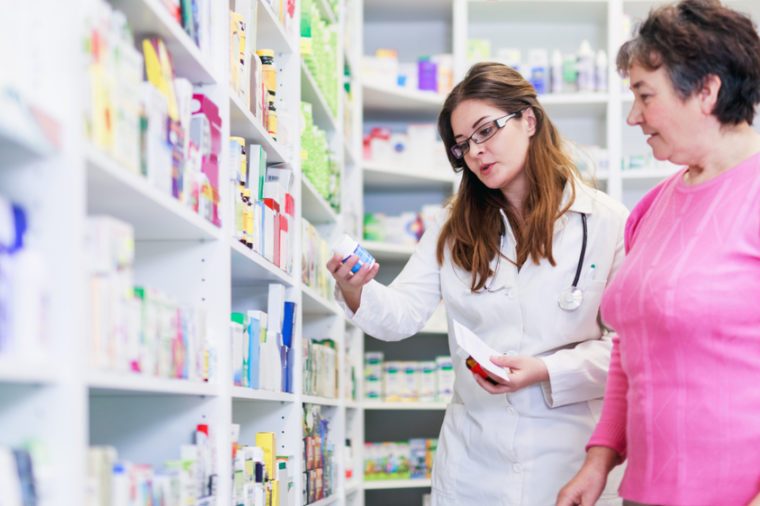 ALEKSANDAR KARANOV/SHUTTERSTOCK
ALEKSANDAR KARANOV/SHUTTERSTOCKAccording to Daniel Zlott, a pharmacist at the National Institutes of Health, this may not always be the case for you. “I’ve seen serious complications” with over-the-counter meds, he says. Here are some over-the-counter medication mistakes you didn't know you were making.
An over-the-counter version of your medication might do the trick
 MIKE FLIPPO/SHUTTERSTOCK
MIKE FLIPPO/SHUTTERSTOCKYou may just need to take more pills and forgo insurance reimbursement. But always talk to your pharmacist, and do the math.
We'll save you money if we can
 GANG LIU/SHUTTERSTOCK
GANG LIU/SHUTTERSTOCK“A good part of a pharmacist’s time is spent dealing with patients and their incomes,” says pharmacist Cindy Coffey. Part of that is suggesting generic or OTC alternatives. Or if a doctor has prescribed a newer drug with no generic alternative available, says Zlott, “I might call the doctor to suggest an older drug that’s equally effective.” Here are some questions to ask that could save you money on medication.
I’d think twice about using a drive-through pharmacy
 DENISE KAPPA/SHUTTERSTOCK
DENISE KAPPA/SHUTTERSTOCK
Our drive-through window may be convenient, but most pharmacists don’t like them. An Ohio State study found that pharmacists believe the distractions associated with drive-through service contribute to delays, reduced efficiency and even dispensing errors. They also create the unrealistic expectation of fast-food-like service. So the next time you’re frustrated and stuck behind five cars, try to remember that getting the wrong prescription is much more dangerous than getting the wrong burger at McDonalds’s—and try to be patient.
The more I know you, the more I can help you
 STOCKFOUR/SHUTTERSTOCK
STOCKFOUR/SHUTTERSTOCK“The better I know you as a patient—your health history, your family, and how busy your life is—the better I can tailor medications to fit your lifestyle,” says Zlott. “You may not want to take a drug three times a day, for example, and I’ll know that if I know you.”
Generics are a close match for most brand names
 JJ IMAGE/SHUTTERSTOCK
JJ IMAGE/SHUTTERSTOCKBut I’d be careful with blood thinners and thyroid drugs, since small differences can have big effects.
Don't try to get anything past us
 WAVEBREAKMEDIA/SHUTTERSTOCK
WAVEBREAKMEDIA/SHUTTERSTOCKPrescriptions for painkillers or sleeping aids always get extra scrutiny. Here are some lies you should never tell your doctor.
When in doubt, ask
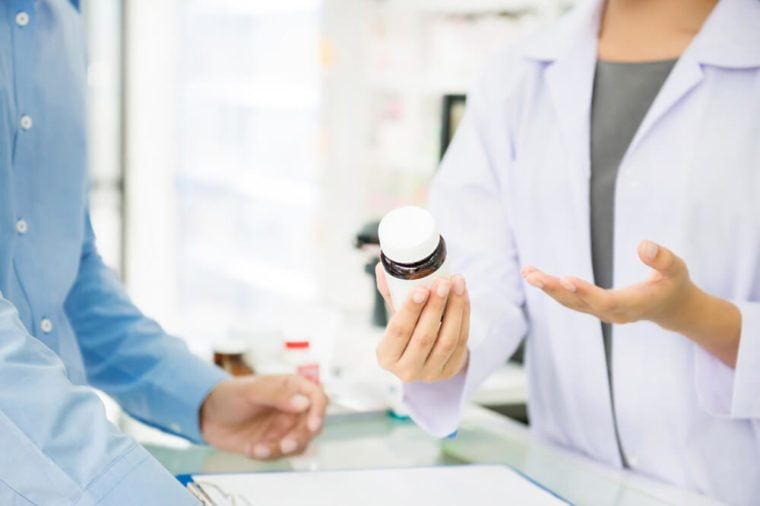 ATSTOCK PRODUCTIONS/SHUTTERSTOCK
ATSTOCK PRODUCTIONS/SHUTTERSTOCKI can give you a generic refill that’s different from the one you started with. Online resources like cvs.com let you double-check your pill.
Use one pharmacy if you can
 I VIEWFINDER/SHUTTERSTOCK
I VIEWFINDER/SHUTTERSTOCKThere’s not some big computer database that tracks your drugs and flags interactions for pharmacists everywhere. If you start using a new pharmacy, make sure we know what you’re taking.
Here's how to avoid lines
 YANADHORN/SHUTTERSTOCK
YANADHORN/SHUTTERSTOCKIt gets busy Monday and Tuesday evenings, since many new prescriptions and refills come in after the weekend. Also, steer clear of pharmacies on the first few days of the month—that’s when Social Security checks arrive and recipients swamp the pharmacy. Generally, the best time to visit is in the middle of the week or during the workday (but stay away at lunch hour).
Look into the $4 generics
 MEHMET DILSIZ/SHUTTERSTOCK
MEHMET DILSIZ/SHUTTERSTOCKChains like Target, Kroger, and Wal-Mart offer them. And it can’t hurt to ask your pharmacy if it will match the price.
Yelling at me won't help
 CATALIN PETOLEA/SHUTTERSTOCK
CATALIN PETOLEA/SHUTTERSTOCKIf I can’t reach your doctor and/or insurance company to approve a refill, there’s nothing I can do about it. “It’s frustrating,” says Zlott, “but I’d be breaking the law in some states if I gave it to you.”
Pharmacists are required by law in most states to counsel patients and answer their questions
 PIKSELSTOCK/SHUTTERSTOCK
PIKSELSTOCK/SHUTTERSTOCKIf your pharmacist seems too busy to talk with you, take your business someplace else. Check out these other signs you need to fire your doctor.
Pharmacists are filling more prescriptions than ever
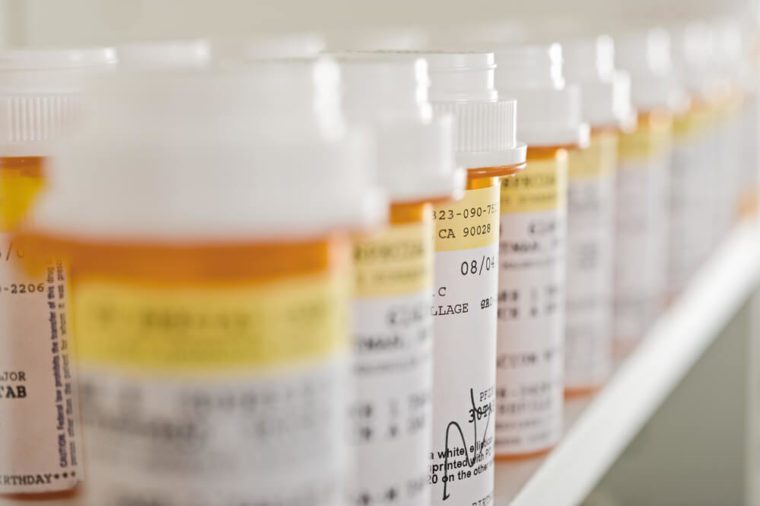 SIRTRAVELALOT/SHUTTERSTOCK
SIRTRAVELALOT/SHUTTERSTOCK“Some pharmacies are so volume-driven that the pharmacist can’t look up all day,” says Coffey. There were a record 3.8 billion prescriptions filled in the U.S. in 2007—a 13 percent increase from 2003. If I’m grumpy, there’s a reason. In most chain stores, I have 15 minutes to fill a prescription, and I get reprimanded if I’m too slow. I may also be expected to answer the phone, counsel patients, call insurance companies, and run the cash register—all while making sure you get the right medicine at the right dosage.
Sometimes we can't read the doctor's handwriting either
 MICHAEL NIVELET/SHUTTERSTOCK
MICHAEL NIVELET/SHUTTERSTOCKE-prescribing can help, but as of 2006, fewer than 20 percent of prescriptions were being electronically transmitted. This is the real reason doctors often have such messy handwriting.
I hate your insurance company as much as you do
 VINNSTOCK/SHUTTERSTOCK
VINNSTOCK/SHUTTERSTOCK“Even if something’s working for you, the insurance company may insist you switch to something else,” says pharmacy owner Stuart Feldman. “I’m stuck in the middle trying to explain this to customers.” These are 18 secrets your health insurance company is keeping from you.
We can give flu shots in most states
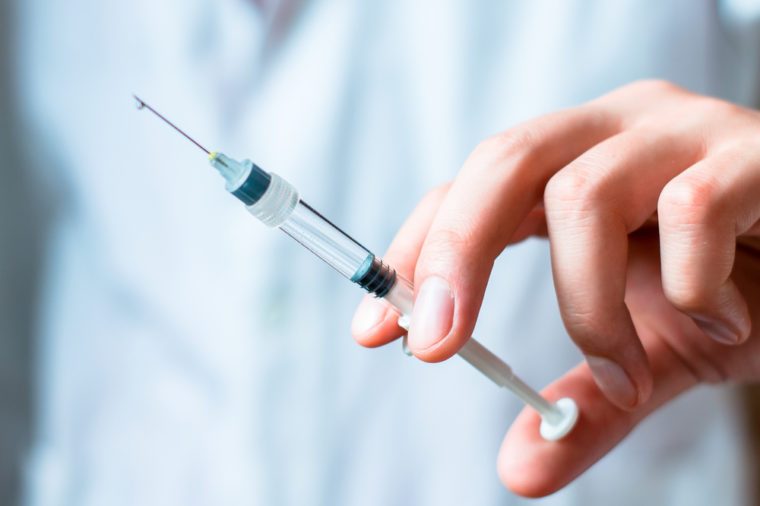 FUNNYANGEL/SHUTTERSTOCK
FUNNYANGEL/SHUTTERSTOCKJust ask us. Also know that when I ask, “Would you like to get a flu shot today?” I’m not just asking for your health; flu shots are so profitable that some stores give clerks a monetary bonus at certain times of the year based on how many immunizations they sell.
People take too many drugs
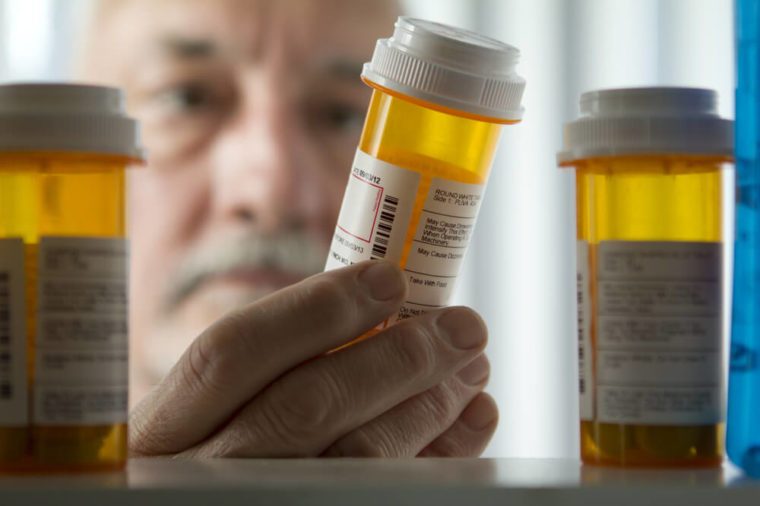 BURLINGHAM/SHUTTERSTOCK
BURLINGHAM/SHUTTERSTOCKTwo out of every three patients who visit a doctor leave with at least one prescription for medication, according to the Institute for Safe Medication Practices. “Drugs are an easy solution,” says Feldman, “but there are other solutions.” Here are things you need to know right now about taking too many medications.
Always ask to get the lowest price
 PIKSELSTOCK/SHUTTERSTOCK
PIKSELSTOCK/SHUTTERSTOCK
When it comes to paying for prescriptions, you have to ask to get the lowest price. In a Consumer Reports study, secret shoppers who were quoted a higher price at first were often able to negotiate a discount if they just asked. So the lesson is: be pushy.
We wear white to inspire trust
 PIKSELSTOCK/SHUTTERSTOCK
PIKSELSTOCK/SHUTTERSTOCK
Many of us require our pharmacists wear white lab coats because we know it inspires trust. In one study, three out of four respondents judged a pharmacist in a white lab coat as more competent and approachable compared to one who was just dressed professionally. Here are some more secrets your hospital isn't telling you.
Beware this word: phenylephrine
 RACORN/SHUTTERSTOCK
RACORN/SHUTTERSTOCK
That’s the active ingredient in most over-the-counter cold medicines, but it’s no better than a placebo. Drugmakers started using it after pseudoephedrine, a decongestant that does work, was forced behind the counter because it was being used to make meth. Here are some medical terms you should be sure to never confuse.
Want a discount on your prescription?
 ANDREI_R/SHUTTERSTOCK
ANDREI_R/SHUTTERSTOCK
Ask your doctor for a 90-day refill instead of 30. Most pharmacies offer discounts and mailing services for a three-month supply.
Electronic prescriptions are not instant
 BILLION-PHOTOS/SHUTTERSTOCK
BILLION-PHOTOS/SHUTTERSTOCK
Ordinarily, they’re sent to a third-party service that then sends them to us in hourly batches. So don’t drive straight to the drugstore after your doctor sends an e-script and expect it to be ready. Call first. Here are some more things you need to know about buying medicine online.
Did you know I can save you a trip to the doctor?
 ANDREY_POPOV/SHUTTERSTOCK
ANDREY_POPOV/SHUTTERSTOCK
At our in-store clinic, I can treat your child’s ear infection, do a sports physical, diagnose head lice, and more. (Here are the things you shouldn't do before a doctor's appointment,)
High health-care costs aren’t lining my pockets
 WAVEBREAKMEDIA/SHUTTERSTOCK
WAVEBREAKMEDIA/SHUTTERSTOCK
Even though pharmacists counsel patients every day, the federal government does not recognize us as health-care providers. That makes it very difficult for us to get reimbursed by insurance companies and government programs for the clinical services we provide.
Ask me if I can fill your prescriptions for Fido too
 BIGNAI/SHUTTERSTOCK
BIGNAI/SHUTTERSTOCK
As long as the same drug is also prescribed for humans, I typically charge less than your vet—and I can even add chicken flavor to make it taste better. Learn the secrets your veterinarian won't tell you.
If you’re paying out of pocket for your drugs, shop around
 SVITLANA-SOKOLOVA/SHUTTERSTOCK
SVITLANA-SOKOLOVA/SHUTTERSTOCK
Your generic medication may cost as much as ten times more at some pharmacies than at others, according to a Consumer Reports survey. Check first with GoodRx, a free app that compares local drug prices.
Consider paying with cash
 PTNPHOTO/SHUTTERSTOCK
PTNPHOTO/SHUTTERSTOCK
Even if you have insurance, always ask me whether your prescription will cost less if you pay with cash. Sometimes the cash price is less than your insurance co-pay.
I know that having the pharmacy in the back of the store is annoying
 TRONG NGUYEN/SHUTTERSTOCK
TRONG NGUYEN/SHUTTERSTOCK
But that design is intentional, in the hope that you’ll see something you’ll be tempted to buy as you walk through the aisles.
Try an independent drug store
 SYDA-PRODUCTIONS/SHUTTERSTOCK
SYDA-PRODUCTIONS/SHUTTERSTOCK
If you want more personalized attention and a shorter wait, try an independent drugstore. Independents significantly outperformed chains in customer satisfaction and wait-time surveys conducted by J.D. Power and Consumer Reports.
Don't rush it
 WAVEBREAKMEDIA/SHUTTERSTOCK
WAVEBREAKMEDIA/SHUTTERSTOCK
That line at the pharmacy counter may be annoying, but it's long for a reason. Your pharmacist has a ton of things to do—and it takes time to do it right. "A pharmacist's job to a lay person may seem simplistic, but there are many functions, from reviewing your profile to checking interactions, and making sure you're getting the correct drug, and dosage," says Fernando Gonzalez , RPhI, assistant professor pharmaceutical sciences division at Long Island University's Arnold & Marie Schwartz College of Pharmacy and Health Sciences. "Patients should realize that rushing a prescription is like telling a pilot not to check the landing gear before takeoff," he adds.
Don't cheat on your pharmacist
 MEGAFLOPP/SHUTTERSTOCK
MEGAFLOPP/SHUTTERSTOCK
It may be more convenient to sometimes use the pharmacy at work, and other times, the one closest to home, but filling your prescriptions at multiple locations removes a layer of protection from your care, which could make your prescriptions less effective—or even deadly. Drug interactions are a real thing—and that includes every drug, including those that don't require a prescription. "Make sure all your doctors are aware of every medication you're taking, including over-the-counter medicines, vitamins, and herbs," urges Brian R. Malone, R. Ph, director of Pharmaceutical Services and Medication Safety Officer at NYU Winthrop Hospital on Long Island. Remember that some medications cancel each other out, and others are dangerous to mix. Here are 24 secrets pain doctors won't tell you.
Know what your prescription plan covers
 STAS MALYAREVSKY/SHUTTERSTOCK
STAS MALYAREVSKY/SHUTTERSTOCK
Medication sticker shock is as upsetting to your pharmacist as it is to you. They want you to be able to get the medications best able to make you well, but these conversations are better had with your doctor, or insurance company, rather than your pharmacist. "It's important for patients to have a better understanding of their insurance plans, so they know if certain medications will be covered, or if they will wind up with a huge bill. Pharmacists have become the bearer of bad news regarding plan limitations, copays, and deductibles. For example, if you have a Medicare Part D prescription plan, you may want to review your options prior to selecting a plan with your pharmacist," recommends Gonzalez.
Brown bag it
 BRANISLAV NENIN/SHUTTERSTOCK
BRANISLAV NENIN/SHUTTERSTOCK
Your conditions change over time, and so do the medications on the market which can treat them. To make sure you're getting the best, up-to-the-minute care available, Malone suggests bringing all of your medications to your doctor, at least once a year. "Brown bagging your medicines can help you and your doctor talk about them and find out if there are any problems," he adds.
Don't take (medical) matters into your own hands
 JACOB LUND/SHUTTERSTOCK
JACOB LUND/SHUTTERSTOCK
Medications can become expensive, but don't let cost jeopardize your health. According to Gonzalez, patients should become better educated about their medication options, including their cost, but must be proactive, and ask to be counseled, if that information isn't readily supplied. "Today's drugs are so potent and so expensive. Taking them correctly is the key to disease management. Many patients who have reached, or exceeded, their plans max now have to pay a higher fee for their prescriptions and tend to start extending the medications they have by not taking them as prescribed, or not taking them at all. This is a very dangerous practice," he says. Talk to your doctor or pharmacist about plans which may be more affordable for you, and find out which drug manufacturers might be willing to provide you with free or lower-cost medications.
Ask questions
 PHOTOGRAPHEE.EU/SHUTTERSTOCK
PHOTOGRAPHEE.EU/SHUTTERSTOCK
Your pharmacist lives and breathes medications all day. They are an incredibly knowledgeable resource you should use, especially if you've got a doctor who watches the clock during appointments. "Always ask for information about your medicines in terms you can understand," says Malone, who suggests writing down these questions, and taking them with you, each time you fill a new prescription:
- What is this medicine for?
- How am I supposed to take it and for how long?
- What side effects are likely? What should I do if they occur?
- Is this medicine safe to take with other medicines or dietary supplements?
- What food, drinks, or activities should I avoid while taking this medicine?
Make sure to write down the answers and to ask for clarification if you don't understand something your pharmacist says.
Save the Internet for social networking, not for buying medicine
 ALEXANDER KHORUZHENKO/SHUTTERSTOCK
ALEXANDER KHORUZHENKO/SHUTTERSTOCK
"Patients need to have an understanding of the dangers of purchasing medications from unapproved sources. Examples of this are invalid Internet sites, that could offer prescription drugs at dramatically low prices. In most case, these are unapproved, and may even be counterfeit. The U.S. Food & Drug Administration has the highest standards of drug approval in the world, and all manufacturers must comply. That is not true of drugs you buy from unauthorized sources, including individuals who claim to be selling prescription drugs they no longer need," says Gonzalez. In some cases, this is even illegal, according to WebMD.
Check and double check
 MOUSTACHE GIRL/SHUTTERSTOCK
MOUSTACHE GIRL/SHUTTERSTOCK
Ask to look at your medication bottles before they are bagged. "Patients should check their medications before they leave the pharmacy. Look at the vial to check the name of patient, drug, doctor, and directions. Patients need to talk to the intern or pharmacist, not the cashier, to get these answers. If your medications look different, either in shape or color, always check with the pharmacist," says Gonzalez. Don't miss these silent signs your medication is making you sick.
Ask for help when you need it
 WHYFRAME/SHUTTERSTOCK
WHYFRAME/SHUTTERSTOCK
"Have your family, or caregivers, pre-pour your medications into a medication planner if you find that you're forgetting to take your medications, says Malone. This can also help you to avoid dangerous overdoses if you don't remember taking your medication and accidentally take it twice.
Travel wisely
 HONEYBEE49/SHUTTERSTOCK
HONEYBEE49/SHUTTERSTOCK
Whether you plan to travel around the world, or simply to another state, be proactive about your medications. You may forget, or lose, something you desperately need, without a pharmacy you trust nearby. "When traveling, keep a list of all your medications with both brand and generic names. There are drugs manufactured in other countries with the same brand name as in the U.S. which contain different active ingredients. Patients should also know to keep medications in their carry on bags. In addition, dosage adjustments for time zone changes may be needed. Consult with your pharmacist before you go!" stresses Gonzalez.
Check expiration dates
 SCIENCE PHOTO/SHUTTERSTOCK
SCIENCE PHOTO/SHUTTERSTOCK
"Outdated medications not only lose their strength, but can also become toxic, and make you ill," says Malone. Schedule a specific time once or twice a year, for checking expiration dates on your prescription, and over-the-counter medications, and dump anything that has expired. Some people do this when they change the batteries in their smoke detectors, or as part of an annual spring cleaning ritual. Here are some more non-food things you didn't realize had expiration dates.
Turn on the lights
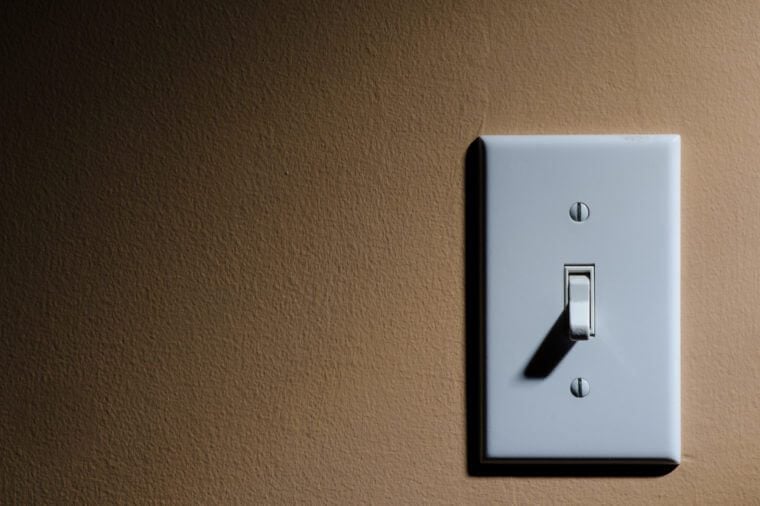 SHARPSHUTTER/SHUTTERSTOCK
SHARPSHUTTER/SHUTTERSTOCK
Don't ever take medications without your glasses on, if you wear glasses, or in the dark or semi-dark. Believe it or not, Malone was once consulted by someone who'd put hydrocortisone cream on her toothbrush for two days straight. Another woman contacted him when she accidentally took her dog's worm medication. Taking medication can become an automatic thing that you do without thinking. Rather than going on auto-pilot, stop for a minute, and make sure you are taking what you're supposed to in the right dosage.
Personalize your medication bottles
 DAVID SMART/SHUTTERSTOCK
DAVID SMART/SHUTTERSTOCK
If you live with others, separate everyone's medications if possible and keep them in different places. If that is not practical, find a way to identify each household member's meds, including pets. Pill bottles all look alike, and so do many pills. Try color-coding the bottles with a marker or with nail polish so you don't take someone else's drugs by mistake. Here are the signs you might be taking too many prescriptions.
Keep your medications at room temperature
 MRS_YA/SHUTTERSTOCK
MRS_YA/SHUTTERSTOCK
And then there's the one about the woman who took over-the-counter allergy pills which had been kept in a hot glove compartment for two days. She became violently ill (plus got no allergy relief). "Don't keep medication in direct sunlight, or subject them to extreme temperatures, ever," says Malone. Life-saving medications, such as nitroglycerin, lose their effectiveness if they are kept in too-hot temperatures for too long. According to NPR, all medications should be kept at room temperature, unless their label specifies that they be refrigerated. Learn the simple steps to organizing your medicine cabinet.
Don't crush it
 ROGER COSTA MORERA/SHUTTERSTOCK
ROGER COSTA MORERA/SHUTTERSTOCK
Malone stresses that even though pills are sometimes hard to swallow, they should never, ever be crushed up without your doctor's OK. This is because some medications are time-released and are designed to slowly enter your bloodstream. Crushing them up eliminates their ability to work as they should and may even be dangerous. If you are having trouble swallowing your pills, do not stop taking your medication. Talk to your doctor about alternative drugs, such as those in liquid form, which will be easier for you to tolerate. Next, learn the things pharmacists keep in their own medicine cabinets.
Sources: Dr. Daniel Zlott, oncology pharmacist, National Institutes of Health; Cindy Coffey, PharmD; Greg Collins, pharmacy supervisor, CVS/pharmacy, California; Stuart Feldman, owner, Cross River Pharmacy, New York. Lisa Gill, deputy content editor at Consumer Reports Best Buy Drugs project; David Zgarrick, acting dean and professor for the Department of Pharmacy and Health Systems Sciences at Northeastern University; an anonymous pharmacist at Rite-Aid and an anonymous pharmacist at Walgreens; Jesse Pike Jr., owner of Pike’s Pharmacy in Charlotte, North Carolina; Lajaynees Ingram, a former drugstore cashier and pharmacy technician; and Fernando Gonzalez, RPhI, assistant professor pharmaceutical sciences division at Long Island University's Arnold & Marie Schwartz College of Pharmacy and Health Sciences
- লিঙ্ক পান
- ইমেল
- অন্যান্য অ্যাপ
মন্তব্যসমূহ
একটি মন্তব্য পোস্ট করুন